
Khwaja Khurshid Anwar was a Pakistani filmmaker, writer, director and music composer who earned recognition in both India and Pakistan. He is credited as being one of the most original and inventive music directors of his generation. He was the Programme Producer (Music) at (AIR), All India Radio or Akashvani, Delhi in 1939.

Naseem Begum, known professionally as Mala, was a Pakistani playback singer of Urdu and Punjabi films.
Muhammad Aurangzeb or Qateel Shifai was a Pakistani Urdu poet and lyricist.
Jhoomer is a 1959 Pakistani film directed by Masood Parvez, producer by Khwaja Khurshid Anwar who wrote the screenplay also. The music composition was also done by Anwar and lyrics by Tanvir Naqvi. It stars Musarrat Nazir, Allauddin, Sudhir and Naeem Hashmi.

Dil Mera Dharkan Teri is a 1968 Pakistani Urdu-language musical romance film produced by Murtaza Aftab and directed by M. A. Rasheed. The film cast Waheed Murad, Shamim Ara, Rani, Lehri, Salma Mumtaz, Nighat Sultana and Talish.
Musarrat Nazir Khawaja is a Pakistani singer and film actress, who acted in many Urdu and Punjabi films. She, many years later, also sang solo, mostly wedding and folk songs.
Habib-ur-Rehman, better known by his screen name Habib, was a Pakistani film actor, director, producer and a television actor. He was one of the busiest heroes of the Pakistani film industry and established himself as one of the most successful actors of Pakistani cinema, acting in almost 600 movies in a career spanning 60 years. He appeared in both Punjabi and Urdu language movies.

Bibbo was a music composer, singer and actress who worked in both Indian and Pakistani films. She acted in Indian cinema from 1931 to 1947 before moving to Pakistan, following Partition of India in 1947. She started her acting career with Ajanta Cinetone Ltd. in 1933, working with directors like M. D. Bhavnani and A. P. Kapoor. She was one of the top leading ladies of the 1930s along with actresses like Devika Rani, Durga Khote, Sulochana, Mehtab, Shanta Apte, Sabita Devi, Leela Desai and Naseem Banu. She was referred to as "one of the most important female stars of the 1930s and 1940s". Her fame had her featured in the lyrics of a popular song from the film Gharib Ke Lal (1939) sung by Mirza Musharraf and Kamla Karnataki, with music by Sagheer Asif and lyrics by Rafi Kashmiri. "Tujhe Bibbo Kahoon Ke Sulochana", where Sulochana referred to another popular actress of the time. This was the first time a song featuring famous actors was used in the lyrics of a film song.

Kauser Parveen was a Pakistani playback singer during the 1950s and 1960s. She is known for vocalizing popular songs like, "O Maina Na Jane Kya Hogaya Kahan Dil Khogaya", "Pal Pal Jhoomun Jhoom Ke Gaun", and the film lullaby, "Raaj Dularey, Meri Ankhiyon Ke Taray".
Safdar Hussain was a Pakistani musician who composed playback melodies for Urdu and Punjabi Lollywood films in the decades from 1950s to 1980s.
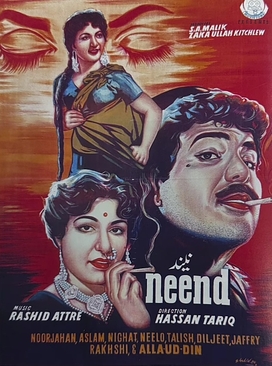
Neend is a Pakistani drama film directed by Hassan Tariq in his directorial debut and released in 1959. Based on a story and screenplay by Riaz Shahid, the films stars Noor Jehan, Neelo and Aslam Pervaiz with Nighat Sultana, Allauddin and Agha Talish in supporting roles. The music was done by Rashid Attre while Noor Jehan also sang her own songs in the film.
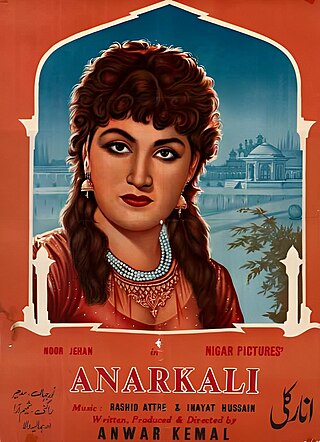
Anarkali is a 1958 Pakistani historical drama film, directed by Anwar Kamal Pasha and starring Noor Jehan and Sudhir in lead roles. Based on the Urdu play of the same name by Imtiaz Ali Taj, the screenplay is written by Qamar Ajnalvi. The film revolves around the love of Jahangir for a slave girl Anarkali which creates a serious conflict between Prince Jahangir and his father, Mughal emperor Akbar. The film was released on 4 June 1958 and its performance was 'average' at the Box Office.
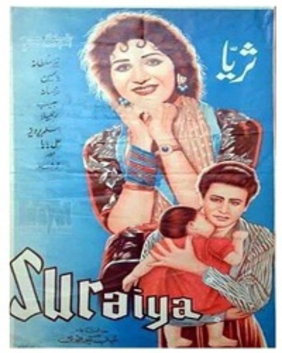
Surayya is a Pakistani melodrama film directed by Shabab Kiranvi, who also wrote the screenplay and dialogues. The films stars Nayyar Sultana in the titular role along with Habib-ur-Rehman, who played the male lead, and both played the young to old roles in the film. The film was released in January 1961 and was a box office hit. At annual Nigar Awards, Rehman won Best Actor award for his performance in the film.
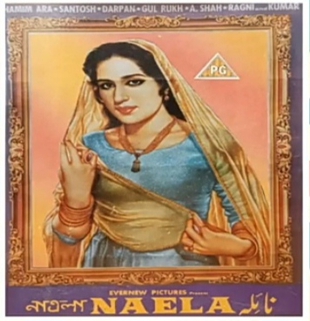
Naila is a 1965 Pakistani musical romance drama film, directed by Sharif Nayyar, who also wrote the screenplay. The film is based on the novel of the same name by Razia Butt. It stars Shamim Ara in the title role with Santosh Kumar and Darpan in substantial roles. The film revolves around Naila, who loves her fiancé Zafar, but Zafar's brother falls for her.
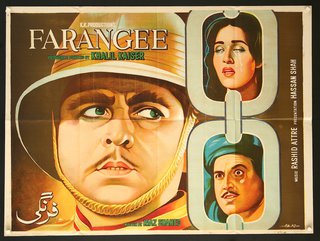
Farangi is a 1964 Pakistani Urdu film. It is directed by Khalil Qaiser and written by Riaz Shahid. It was the second film produced by Khalil Qaiser's newly found K. K. Productions. The film stars Sudhir, Shamim Ara and Agha Talish with Bahar Begum and Allauddin. Set in 1910s and 1920s at the time of British Raj, Farangi revolves around the battle of a Pashtun freedome fighter against the british army. The film was a golden jubilee success and features some memorable poems by Faiz Ahmad Faiz and Sahir Ludhianvi, with music composed by Rashid Attre. Ara and Talish's performances in the film were praised. At Nigar Awards 1964, it received four awards including Best Actress for Ara.
Naheed Niazi is a former Pakistani playback singer who performed in the Lollywood movies during the era of 1960s. She was married to musician Muslehuddin; her sister is the singer Najma Niazi. She is known for her playback songs, "Chali Re Chali Re Main To Des Piya Ke Chali Re", "Raat Saloni Ayi", and others.

Intezaar (transl. Wait) is a Pakistani musical romance film directed by Masood Parvez.

Hamraz is a Pakistani suspense thriller mystery film directed by Khwaja Khurshid Anwar. The film was loosely based on Wilkie Collins's 1860's novel The Woman in White. It started Shamim Ara and Mohammed Ali. Agha Talish, Lehri, Tariq Aziz and Meena Shorey appeared in supporting roles. It was released on 20 October 1967. The film is one of the Anwar's signature films for which he wrote the screenplay and composed the music also. The plot revolves around two sisters, and the conspiracy against them to grab their property.
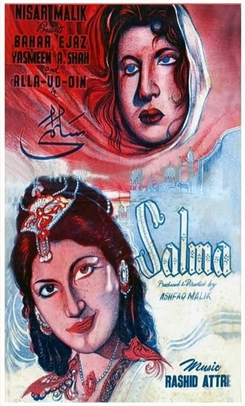
Salma is a 1960 Pakistani film directed by Ashfaq Malik and written by Nazir Ajmeri.

Clerk is a Pakistani film directed by Khalil Kaiser, who also played the titular role of a poor clerk tired of his economic condition and hectic daily routine. It marked his only appearance as an actor. It also stats Musarrat Nazir and Ratan Kumar in important roles. The story was written by Younis Rahi with dialogues by Riaz Shahid. Safdar Hussain was the music composer.














